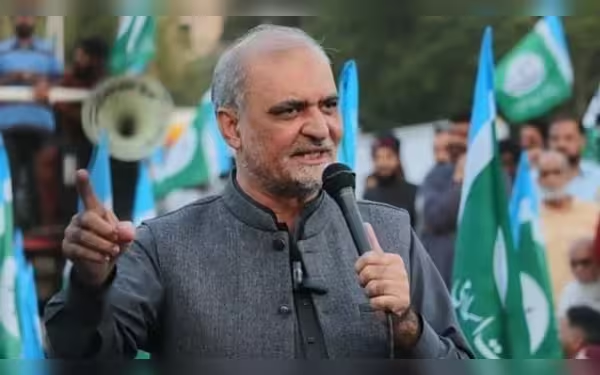Saturday, November 16, 2024 05:55 PM
Hafiz Naeem Urges Government to Cut Electricity Bills in Pakistan
- Jamaat-e-Islami demands reduction in electricity charges.
- Hafiz Naeem leads 'Haq Do Awam' movement for citizens' rights.
- Political resistance to continue independently from other parties.
 Image Credits: jasarat
Image Credits: jasaratHafiz Naeem of Jamaat-e-Islami demands urgent reduction in electricity bills to alleviate citizens' financial burdens in Pakistan.
In recent times, the issue of rising electricity bills has become a significant concern for the citizens of Pakistan. Many families are struggling to pay their monthly electricity charges, which have seen a steep increase. This situation has prompted various political parties to voice their opinions and demands for relief. One such party is Jamaat-e-Islami Pakistan, led by Hafiz Naeemur Rehman, who has taken a firm stance on this pressing issue.
During an online meeting that saw participation from 54,000 members across the nation, Hafiz Naeemur Rehman made it clear that Jamaat-e-Islami will not back down until the government fulfills its commitments regarding electricity bills. He stated, “The government must reduce electricity charges without fail.” This statement reflects the party's determination to advocate for the rights of the people, particularly in light of the financial burden that high electricity costs impose on households.
Rehman highlighted the party's ongoing movement, “Haq Do Awam,” which translates to “Give Rights to the People.” This initiative aims to secure the rights of citizens, ensuring that their voices are heard in the corridors of power. He expressed satisfaction with the enthusiastic response to the party's membership campaign, encouraging citizens to join Jamaat-e-Islami and participate in what he described as a peaceful resistance movement.
Furthermore, Rehman emphasized that Jamaat-e-Islami intends to engage in political discussions with various parties, including the Pakistan Muslim League-Nawaz (PML-N), Pakistan Peoples Party (PPP), and Pakistan Tehreek-e-Insaf (PTI). However, he was clear in stating that the party will not form alliances with any of these groups during elections. “Whether it is a public movement, a stance, or a campaign, Jamaat-e-Islami will conduct political resistance independently,” he asserted.
In addition to advocating for reduced electricity bills, Rehman called for the termination of further Independent Power Producer (IPP) agreements, which he believes are detrimental to the public's financial well-being. His remarks resonate with many citizens who feel overwhelmed by the rising costs of living and are seeking immediate relief from the government.
As the situation unfolds, it is evident that the demand for lower electricity bills is not just a political issue but a matter of survival for many families in Pakistan. The government's response to these demands will be crucial in determining the future of energy policies and the overall economic health of the nation. Citizens are watching closely, hoping for a resolution that will ease their financial burdens and restore some stability to their lives.













